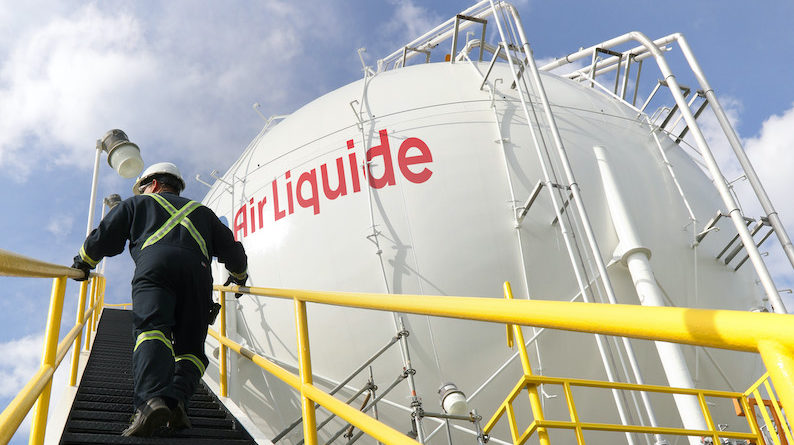
Unleashing the power of clean hydrogen for a carbon-neutral future
Hydrogen molecule, the oldest and simplest molecule in our Universe, is found in great quantities on Earth combined with other elements, such as in water and hydrocarbons, however is barely present in our atmosphere. It has recently reached the top of the political agenda, having a tremendous potential being a major enabler for building a low-carbon society. As an industrial gas player, Air Liquide has a key role to play fostering innovation and adapting to new sustainability demands. Air Liquide is addressing two major challenges: the decarbonation of the industry and the mobility revolution.
The European Commission has released the first legislative package, supporting its commitment to reduce net greenhouse gas emissions by at least 55 per cent by 2030. Air Liquide is fully committed to support the objectives of this ambitious package that represents a unique opportunity for the industry to innovate, turn Europe’s climate targets into a reality and to become the first climate-neutral continent by 2050.
In full support of the 2015 Paris agreement, the Air Liquide commitments address the urgency of climate change and energy transition, targeting carbon neutrality by 2050.
Air Liquide, already contributing through its environmental and societal actions and commitments to achieve some of the Sustainable Development Goals set up by the United Nations, wherever it can make a real difference, is convinced that it is, more than ever, time to act. Our commitments are based on 3 pillars : Abatement of CO2 emissions ; Care for patients ; Trust as the base to engage with our employees and to build a best-in-class governance.
Renewable Hydrogen at the heart of decarbonization of our society…
Hydrogen is a cornerstone of the energy transition. In order to further decarbonize our society, the development and scale-up of low- carbon and renewable Hydrogen will be key. It offers a tremendous growth potential as a competitive climate-friendly solution for a wide range of applications such as industrial usages, space applications and clean mobility.
Air Liquide has 50 years of experience in mastering the entire Hydrogen value chain, and a pioneering role over the last 20 years to shape the role of hydrogen as a key energy transition enabler. The Group has developed unique expertise enabling it to master the entire supply chain, from production and storage to distribution, contributing to the widespread use of hydrogen as a clean energy carrier It is committed to the development of new capacities of both renewable and low- carbon hydrogen production; in this regard, it will invest over €8bn by 2035.
As such, Air Liquide currently owns and operates 40 electrolyzers including the largest electrolyser in the world, commissioned early 2021, Proton Exchange Membrane (PEM) low-carbon hydrogen 20MW production unit in Bécancour, Canada. Powered by 99% renewable energy, this unit can produce over 8.2 metric tons of low-carbon hydrogen daily – enough to fuel more than 2,000 cars, 16,000 forklifts, 275 buses, or 230 large trucks. This enables the Group to supply its North American industrial customers and mobility markets with decarbonized, high-purity hydrogen and help reduce their carbon footprint. It will avoid the emission of around 27,000 tonnes of CO2 per year (emissions of 10,000 cars per year).
As announced in July 2021, another worldscale PEM electrolyzer will be the first to be built in the framework of the partnership between Air Liquide and Siemens Energy in Oberhausen, Germany.
With a total capacity to reach 30MW, a first phase of the project is expected to be operational by early 2023 with 20 MW in order to support sectors such as Steel, Chemicals, Refining and Mobility in North Rhine-Westphalia by accelerating the availability of gases produced with renewable electricity for their efforts to reduce their carbon footprint.
Last but not least, Air Liquide and a group of international companies launched in October 2021 the world’s largest clean hydrogen infrastructure fund. The fund aims to reach 1.5 billion euros and has already secured initial commitments of 800 million euros. With the creation of this fund, Air Liquide is demonstrating its leadership to participate in a collective dynamic with the objective to accelerate the growth of the clean hydrogen ecosystem by investing in large strategic projects and leveraging the alliance of industrial and financial players.
…from the ground…
Faced with the climate emergency, it is time to switch from awareness raising to action. The importance given to the energy transition in the EU economic recovery plans of several countries underlines this shift.
With this in mind, we have founded several initiatives worldwide, such as the Hydrogen Council which brings together more than 100 executive officers of large international companies. The Group is also forming public- private partnerships, such as in California and South Korea, to develop hydrogen mobility. As well as the roll-out of stations for vehicles in Europe, Japan, South Korea and the United States, Air Liquide is also focused on the truck segment.
Large-scale projects are becoming a reality: in Rotterdam in the Netherlands and Fos-sur-Mer in France for example, where the Group is part of key initiatives to develop large-capacity hydrogen stations which will be used to power long-distance trucks.
Alongside hydrogen, biomethane is well placed in the transportation revolution. It decreases travel-related CO2 emissions by 85%, particles by 90% and noise by a potential 50% compared to diesel engines. The Group is investing across the entire value chain of this green energy source, from the recovery and purification of biogas right through to distribution to the end-customer in Bio-NGV stations (natural gas for vehicles). The major advantage of this energy source: its natural position in a circular economy where biomass, transformed into biomethane, participates in the optimization of natural resources.
Focus HyTrucks initiative
In May 2021, Air Liquide, DATS 24 and Port of Antwerp joined their forces in the HyTrucks consortium to deploy 300 hydrogen-powered trucks and the related renewable hydrogen production infrastructure and supply chain assets in Belgium by 2025. HyTrucks is one of the largest European projects to deploy zero- emission heavy-duty fleets in Europe’s most intense traffic areas. It aims at reducing significantly CO2 emissions by an estimated amount of more than 100,000 tonnes per year, equivalent to 110 million kilometers driven, thanks to 1,000 trucks, and a first network of 25 high-capacity hydrogen stations connecting Antwerp, Rotterdam, and Duisburg. In Belgium only, the HyTrucks project aims at reducing CO2 emissions by an estimated amount of more than 30,000 tonnes per year, equivalent to 33 million kilometres driven.
…to the air and up to space.
Since the 1970s, and thanks to its extensive experience in the field of extreme cryogenics, Air Liquide has developed expertise in liquid hydrogen, which can therefore be used safely and securely for aeronautical applications. The Group thus has solid know-how and certifications to work with the aerospace industry thanks to this in depth expertise also on liquid hydrogen and knowledge of onboard technologies.
Against this background, Air Liquide’s ambition is to contribute to build the sustainable aviation ecosystem alongside the leading players in the sector. Our Group started at the end of the 2000s to promote hydrogen applied to aviation, notably through studies and demonstrators in flight or on land.
In June this year, Air Liquide, Airbus and Groupe ADP signed a Memorandum of Understanding to prepare for the arrival of hydrogen in airports by 2035 as part of the development of hydrogen-powered commercial aircraft.
Very recently, Airbus, Air Liquide and VINCI Airports, three major players in the aviation, hydrogen and airport industries, announced working together to promote the use of hydrogen at airports and build the European airport network to accommodate future hydrogen aircrafts. The airport of Lyon-Saint Exupéry (France) will host the first installations as early as 2023. This partnership reflects the three groups’ shared ambition to combine their respective expertise to support the decarbonization of air travel. Lyon-Saint Exupéry Airport has been chosen as the pilot airport by the partners. Starting as of 2023, this unprecedented project will see the deployment of a hydrogen gas distribution station at Lyon-Saint Exupéry airport. This station will supply both the airport’s ground vehicles (airside buses, trucks, handling equipment, etc.) and those of its partners, as well as the heavy goods vehicles that drive around the airport. This first phase is essential to test the airport’s facilities and dynamics as a “hydrogen hub” in its area of reach. Between 2023 and 2030, the deployment of liquid hydrogen infrastructures will allow hydrogen to be provisioned into the tanks of future aircraft, preparing the deployment of the hydrogen infrastructure from production to mass distribution of liquid hydrogen at the airport as of 2030.
Finally, Air Liquide also continues to participate in the space adventure by developing new technologies for the future Ariane 6 launcher, for electric propulsion for satellites and for projects in connection with space exploration, like the generation and storage of energy and life support in a simulated lunar environment.
A global movement towards a low- carbon society is underway. Accelerating on Hydrogen development is key to mitigate climate change. As a pioneer in hydrogen, Air Liquide commitments address the urgency of climate change, targeting carbon neutrality by 2050, hydrogen being a cornerstone of the energy transition.




